 W
WAnalytical skill is the ability to deconstruct information into smaller categories in order to draw conclusions. Analytical skill consists of categories that include logical reasoning, critical thinking, communication, research, data analysis and creativity. Analytical skill is taught in contemporary education with the intention of fostering the appropriate practises for future professions. The professions that adopt analytical skill include educational institutions, public institutions, community organisations and industry.
 W
WBias in Mental Testing is a book by Arthur Jensen about bias in IQ tests.
 W
WCat intelligence is the capacity of the domesticated cat to solve problems and adapt to its environment. Researchers have shown feline intelligence to include the ability to acquire new behavior that applies knowledge to new situations, communicating needs and desires within a social group and responding to training cues.
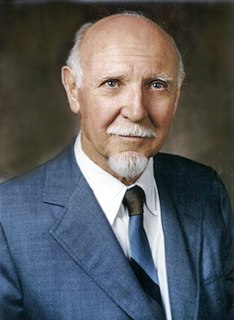 W
WThe Cattell–Horn–Carroll theory, is a psychological theory on the structure of human cognitive abilities. Based on the work of three psychologists, Raymond B. Cattell, John L. Horn and John B. Carroll, the Cattell–Horn–Carroll theory is regarded as an important theory in the study of human intelligence. Based on a large body of research, spanning over 70 years, Carroll's Three Stratum theory was developed using the psychometric approach, the objective measurement of individual differences in abilities, and the application of factor analysis, a statistical technique which uncovers relationships between variables and the underlying structure of concepts such as 'intelligence'. The psychometric approach has consistently facilitated the development of reliable and valid measurement tools and continues to dominate the field of intelligence research.
 W
WThe term chess prodigy refers to a young child who possesses an aptitude for the game of chess, that far exceeds what might be expected at their age. Their prodigious talent will often enable them to defeat experienced adult players and even titled chess masters. Some chess prodigies have gone on to become World Chess Champion.
 W
WA child prodigy is defined in psychology research literature as a person under the age of ten who produces meaningful output in some domain to the level of an adult expert.
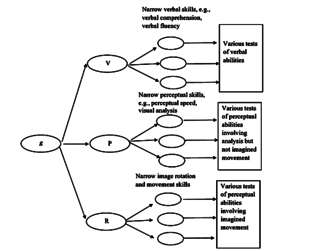 W
WThe g-VPR model is a model of human intelligence published in 2005 by psychology professors Wendy Johnson and Thomas J. Bouchard Jr. They developed the model by analyzing Gf-Gc theory, John Carroll’s Three-stratum theory and Vernon’s verbal-perceptual model.
 W
WGeneral knowledge is information that has been accumulated over time through various mediums. It excludes specialized learning that can only be obtained with extensive training and information confined to a single medium. General knowledge is an essential component of crystallized intelligence. It is strongly associated with general intelligence and with openness to experience.
 W
WAn idiot, in modern use, is a stupid or foolish person.
 W
WIn the study of the human mind, intellect refers to and identifies the ability of the mind to reach correct conclusions about what is true and what is false, and about how to solve problems. The term intellect derives from the Ancient Greek philosophy term nous, which translates to the Latin intellectus and into the French and English languages as intelligence. Discussion of the intellect is in two areas of knowledge, wherein the terms intellect and intelligence are related terms.In philosophy, especially in classical and medieval philosophy the intellect (nous) is an important subject connected to the question: How do humans know things? Especially during late antiquity and the Middle Ages, the intellect was proposed as a concept that could reconcile philosophical and scientific understandings of Nature, with monotheistic religious understandings, by making the intellect a link between each human soul, and the divine intellect of the cosmos. During the Latin Middle Ages the distinction developed whereby the term intelligence referred to the incorporeal beings that governed the celestial sphere; see: passive intellect and active intellect. In modern psychology and in neuroscience, the terms intelligence and intellect describe mental abilities that allow people to understand; the distinction is that intellect relates to facts, whereas intelligence relates to feelings.
 W
WIntellectualism refers to related mental perspectives that emphasize the use, the development, and the exercise of the intellect; and also identifies the life of the mind of the intellectual person. In the field of philosophy, “intellectualism” is synonymous with rationalism, knowledge derived from reason. Moreover, the term intellectualism can also have a socially negative connotation about a man or woman intellectual who gives “too much attention to thinking” and who shows an “absence of affection and feeling”.
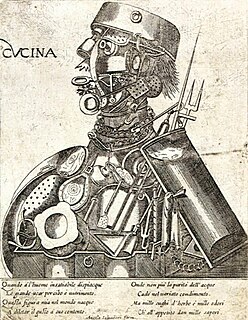 W
WIntelligence amplification (IA) refers to the effective use of information technology in augmenting human intelligence. The idea was first proposed in the 1950s and 1960s by cybernetics and early computer pioneers.
 W
WSteven J. Dick is an American astronomer, author, and historian of science most noted for his work in the field of astrobiology. Dick served as the Chief Historian for the National Aeronautics and Space Administration from 2003 to 2009 and as the Baruch S. Blumberg NASA/Library of Congress Chair in Astrobiology from 2013 to 2014. Before that, he was an astronomer and historian of science at the United States Naval Observatory in Washington, DC, from 1979 to 2003.
 W
WAn intelligence quotient (IQ) is a total score derived from a set of standardized tests or subtests designed to assess human intelligence. The abbreviation "IQ" was coined by the psychologist William Stern for the German term Intelligenzquotient, his term for a scoring method for intelligence tests at University of Breslau he advocated in a 1912 book.
 W
WIntuition is the ability to acquire knowledge without recourse to conscious reasoning. Different fields use the word "intuition" in very different ways, including but not limited to: direct access to unconscious knowledge; unconscious cognition; inner sensing; inner insight to unconscious pattern-recognition; and the ability to understand something instinctively, without any need for conscious reasoning.
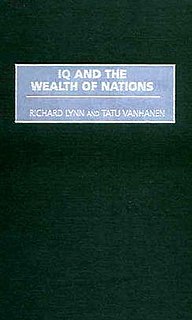 W
WIQ and the Wealth of Nations is a 2002 book by psychologist Richard Lynn and political scientist Tatu Vanhanen. The authors argue that differences in national income are correlated with differences in the average national intelligence quotient (IQ). They further argue that differences in average national IQs constitute one important factor, but not the only one, contributing to differences in national wealth and rates of economic growth.
 W
WLearning is the process of acquiring new understanding, knowledge, behaviors, skills, values, attitudes, and preferences. The ability to learn is possessed by humans, animals, and some machines; there is also evidence for some kind of learning in certain plants. Some learning is immediate, induced by a single event, but much skill and knowledge accumulate from repeated experiences. The changes induced by learning often last a lifetime, and it is hard to distinguish learned material that seems to be "lost" from that which cannot be retrieved.
 W
W"Mainstream Science on Intelligence" was a public statement issued by a group of academic researchers in fields associated with intelligence testing. It was originally published in The Wall Street Journal on December 13, 1994, as a response to what the authors claimed were inaccurate and misleading reports made by the media regarding academic consensus on the results of intelligence research in the wake of the appearance of The Bell Curve by Richard Herrnstein and Charles Murray earlier the same year. It was drafted by professor of educational psychology Linda Gottfredson, sent to 131 researchers, and signed by 52 university professors described as "experts in intelligence and allied fields", including around one third of the editorial board of the journal Intelligence, in which it was subsequently reprinted in 1997. According to a 1996 response by former American Psychological Association president Donald Campbell, more than four-fifths of the signatories were not measurement experts, and, contrary to the letter's claims, "environmental differences between Blacks and Whites in opportunity to learn the vocabulary and other skills used in intelligence tests are adequate to explain Black-White differences in test scores, without any need for positing genetic differences."
 W
WMental age is a concept related to intelligence. It looks at how a specific individual, at a specific age, performs intellectually, compared to average intellectual performance for that individual's actual chronological age. The intellectual performance is based on performance in tests and live assessments by a psychologist. The score achieved by the individual is compared to the median average scores at various ages, and the mental age is derived such that the individual's score equates to the average score at age x.
 W
WThe mind is the set of faculties responsible for mental phenomena. Often the term is also identified with the phenomena themselves. These faculties include sensation, imagination, will, memory and thought. They are responsible for various mental phenomena, like perception, pain experience, belief, desire, intention and emotion. Various overlapping classifications of mental phenomena have been proposed. Important distinctions group them together according to whether they are sensory, propositional, intentional, conscious or occurrent. Minds were traditionally understood as substances but it is more common in the contemporary perspective to conceive them as properties or capacities possessed by humans and higher animals. Various competing definitions of the exact nature of the mind or mentality have been proposed. Epistemic definitions focus on the privileged epistemic access the subject has to these states. Consciousness-based approaches give primacy to the conscious mind and allow unconscious mental phenomena as part of the mind only to the extend that they stand in the right relation to the conscious mind. According to intentionality-based approaches, the power to refer to objects and to represent the world is the mark of the mental. For behaviorism, whether an entity has a mind only depends on how it behaves in response to external stimuli while functionalism defines mental states in terms of the causal roles they play. Central questions for the study of mind, like whether other entities besides humans have minds or how the relation between body and mind is to be conceived, are strongly influenced by the choice of one's definition.
 W
WThe need for cognition (NFC), in psychology, is a personality variable reflecting the extent to which individuals are inclined towards effortful cognitive activities.
 W
WNous, sometimes equated to intellect or intelligence, is a term from classical philosophy for the faculty of the human mind necessary for understanding what is true or real. English words such as "understanding" are sometimes used, but three commonly used philosophical terms come directly from classical languages: νοῦς or νόος, intellēctus and intellegentia. To describe the activity of this faculty, the word "intellection" is sometimes used in philosophical contexts, as well as the Greek words noēsis and noeîn. This activity is understood in a similar way to the modern concept of intuition.
 W
WA scholar is a person who pursues academic and intellectual activities, particularly those that develop expertise in an area of study. A scholar may also be an academic, who works as a professor, teacher or researcher at a university or other higher education institution. An academic usually holds an advanced degree or terminal degree such as a PhD. Some independent scholars, such as philosophers and public intellectuals work outside of academia. They may still contribute to academic journals and participate in scholarly conferences even though they are unaffiliated with a university.
 W
WStupidity is a lack of intelligence, understanding, reason, or wit. It may be innate, assumed or reactive. The word stupid comes from the Latin word stupere. Stupid characters are often used for comedy in fictional stories. Walter B. Pitkin called stupidity "evil", but in a more Romantic spirit William Blake and Carl Jung believed stupidity can be the mother of wisdom.
 W
WThought encompasses a flow of ideas and associations that can lead to logical conclusions. Although thinking is an activity of an existential value for humans, there is still no consensus as to how it is adequately defined or understood.
 W
WThe three-stratum theory is a theory of cognitive ability proposed by the American psychologist John Carroll in 1993. It is based on a factor-analytic study of the correlation of individual-difference variables from data such as psychological tests, school marks and competence ratings from more than 460 datasets. These analyses suggested a three-layered model where each layer accounts for the variations in the correlations within the previous layer.
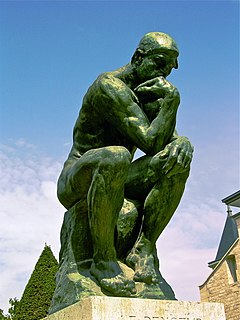 W
WTypical intellectual engagement (TIE) is a personality construct referring to a person's enjoyment of intellectually demanding activities. TIE was developed to identify aspects of personality most closely related to intelligence and knowledge and measures a person's typical performance in intellectual domains rather than their maximal performance. TIE is moderately positively associated with crystallized intelligence, and with general knowledge, and predicts academic performance. TIE is hard to distinguish from the earlier construct need for cognition and is positively correlated with openness to experience.
 W
WVernon's verbal-perceptual model is a theory about the structure of intelligence proposed by Philip E. Vernon in 1964. It was influenced by the theory of g factor.